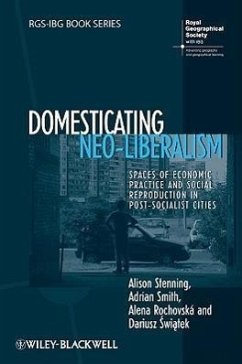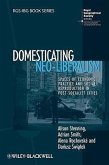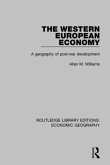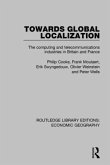Based on in-depth research in Poland and Slovakia, "Domesticating Neo-Liberalism" addresses how we understand the processes of neo-liberalization in post-socialist cities.Builds upon a vast amount of new research dataExamines how households try to sustain their livelihoods at particularly dramatic and difficult times of urban transformationProvides a major contribution to how we theorize the geographies of neo-liberalismOffers a conclusion which informs discussions of social policy within European Union enlargement
Hinweis: Dieser Artikel kann nur an eine deutsche Lieferadresse ausgeliefert werden.
Hinweis: Dieser Artikel kann nur an eine deutsche Lieferadresse ausgeliefert werden.
"Thanks to its nuanced and multi-layered take on thegeographical dimensions of employment, home, land and foodprovision in late capitalism, this monograph will become essentialreading for scholars in the domains of post-socialist area studies,geography, economics, anthropology and sociology, in addition tosocial, urban and economic development policypractitioners." (Royal Geographical Society,2012)
"This book makes a valuable contribution to the theorization ofneoliberalization by extending it to the realm of the everydayhousehold economy. It is grounded in rich empirical research inworking class neighbourhoods in Bratislava and Krakow and arguesthat households mitigate and tolerate the pernicious social costsof neoliberal reform to achieve social reproduction." (YahooFinance, 2 November 2010)
'This richly comparative analysis of the neo-liberalizationof everyday life in East Central Europe also sheds new light on theeveryday lives of neo-liberalism. A marvellous book, it reveals howdaily practices of coping, caring and consuming, productions andreproduction, have been bound into processes of "markettransition", proliferating alternative economies even in thisno-alternative age.'
--Jamie Peck, University of British Columbia
'This book makes a valuable contribution to thetheorization of neo-liberalization by extending it to the realm ofthe everyday household economy. It is grounded in rich empiricalresearch in working class neighbourhoods in Bratislava andKraków and argues that households mitigate and tolerate thepernicious social costs of neo-liberal reform to achieve socialreproduction.'
--Adam Swain, University of Nottingham
"This book makes a valuable contribution to the theorization ofneoliberalization by extending it to the realm of the everydayhousehold economy. It is grounded in rich empirical research inworking class neighbourhoods in Bratislava and Krakow and arguesthat households mitigate and tolerate the pernicious social costsof neoliberal reform to achieve social reproduction." (YahooFinance, 2 November 2010)
'This richly comparative analysis of the neo-liberalizationof everyday life in East Central Europe also sheds new light on theeveryday lives of neo-liberalism. A marvellous book, it reveals howdaily practices of coping, caring and consuming, productions andreproduction, have been bound into processes of "markettransition", proliferating alternative economies even in thisno-alternative age.'
--Jamie Peck, University of British Columbia
'This book makes a valuable contribution to thetheorization of neo-liberalization by extending it to the realm ofthe everyday household economy. It is grounded in rich empiricalresearch in working class neighbourhoods in Bratislava andKraków and argues that households mitigate and tolerate thepernicious social costs of neo-liberal reform to achieve socialreproduction.'
--Adam Swain, University of Nottingham








